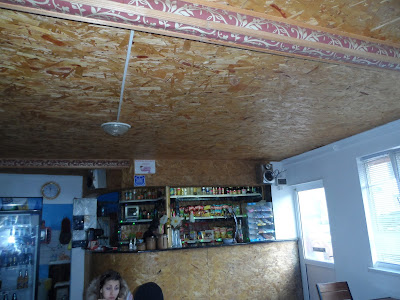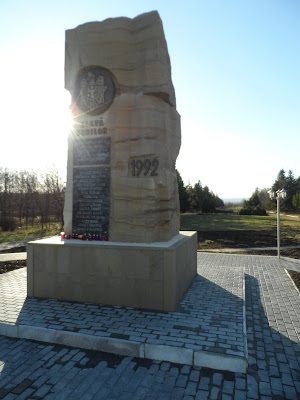Amidst travelling home to England, spending Christmas with my family, and looking for work in the New Year, this blog has sadly not taken priority. However, since I’m determined to finish documenting my travels, I will write as best as my memory can serve me, and hope that being back in England and not Moldova does not taint my narrative. Enjoy!
We set off under clear skies with the low, glaring winter sun giving just a glimpse of warmth, the ubiquitous mud now dry as we trundle over the path from the house and join the main road of the village. Our driver continually swerves to avoid the worst parts of the road, and then lingers on the wrong side to give way to a passing car. A strange concept, but on Moldovan roads the 'normal' perceptions of travel are slightly skewed, as is confirmed when I see a couple pass in a small open carriage, pulled by a donkey. As we near Cantemir, with the open fields stretching wide beside us, I see some men planting an orchard, one leaning on his spade and surveying the vineyard next to him, the Moldovan earth is likely all he knows, and all he has to know. Descending a winding hillside road I take in a panorama of Cantemir, capital of the region of the same name. The town is a sprawling blend of familiar coloured houses, small apartments blocks and grey, vacant factories, with one major road snaking through the middle.
The layout reminds me of my near-native Newton Heath market, but with more stalls and permanent buildings, and less pirated DVDs and counterfeit trainers. Typically dressed ‘babushkas’, laden with bulging plastic bags, hustle through the narrow paths between stalls, and my taking photos puzzles some of them, since I’m hardly in a tourist spot. My girlfriend even overhears one worried stall owner warn the vendor near her that I could be carrying out an inspection for the government. One man stares at me curiously at the end of an alley, and when I pass him he blurts out, in a thick Eastern European accent: “Merry Christmas, Santa Claus”, I smile acknowledging his seasonal greetings despite it being November, but don’t have the heart to tell him that, in fact, I’m not Saint Nicholas.
Aside from the traditional market atmosphere, there is the confusing image of a second hand stall with a flashing disco light hanging above its door as pulsing rave music blares out of a speaker nearby, an obscure sight within the mundane marketplace. Another store sells sweets and confectionary, next to the till is a small piece of history in the form of a pair of old Soviet-era scales that look like something you’d see used to measure out rations in war-plagued Russia. Sparrows dart between the varied and rustic fruit and vegetable stalls, stopping to pick up scraps beside women selling sunflower seeds from huge sacks.
Before leaving the market we wait in line to buy half a dozen plăcintă, and the queueing is worth it for the oven-fresh snacks, warming our hands as they steam away in the chilly piaţă air. A surreal break follows in a bar where the ceiling is made of chipping board, as we drink instant coffee while most other punters wield full tankards of beer, ‘Mr. Bombastic’ by Shaggy plays, and the Kafkaesque painting is complete.
Finally, we pick up my girlfriend’s sister from her high school, before visiting the war memorial nearby, erected in memory of the Moldovans who lost their lives in the in the Transnistria conflict with Russia.
***
We set off under clear skies with the low, glaring winter sun giving just a glimpse of warmth, the ubiquitous mud now dry as we trundle over the path from the house and join the main road of the village. Our driver continually swerves to avoid the worst parts of the road, and then lingers on the wrong side to give way to a passing car. A strange concept, but on Moldovan roads the 'normal' perceptions of travel are slightly skewed, as is confirmed when I see a couple pass in a small open carriage, pulled by a donkey. As we near Cantemir, with the open fields stretching wide beside us, I see some men planting an orchard, one leaning on his spade and surveying the vineyard next to him, the Moldovan earth is likely all he knows, and all he has to know. Descending a winding hillside road I take in a panorama of Cantemir, capital of the region of the same name. The town is a sprawling blend of familiar coloured houses, small apartments blocks and grey, vacant factories, with one major road snaking through the middle.
The layout reminds me of my near-native Newton Heath market, but with more stalls and permanent buildings, and less pirated DVDs and counterfeit trainers. Typically dressed ‘babushkas’, laden with bulging plastic bags, hustle through the narrow paths between stalls, and my taking photos puzzles some of them, since I’m hardly in a tourist spot. My girlfriend even overhears one worried stall owner warn the vendor near her that I could be carrying out an inspection for the government. One man stares at me curiously at the end of an alley, and when I pass him he blurts out, in a thick Eastern European accent: “Merry Christmas, Santa Claus”, I smile acknowledging his seasonal greetings despite it being November, but don’t have the heart to tell him that, in fact, I’m not Saint Nicholas.
Aside from the traditional market atmosphere, there is the confusing image of a second hand stall with a flashing disco light hanging above its door as pulsing rave music blares out of a speaker nearby, an obscure sight within the mundane marketplace. Another store sells sweets and confectionary, next to the till is a small piece of history in the form of a pair of old Soviet-era scales that look like something you’d see used to measure out rations in war-plagued Russia. Sparrows dart between the varied and rustic fruit and vegetable stalls, stopping to pick up scraps beside women selling sunflower seeds from huge sacks.
Before leaving the market we wait in line to buy half a dozen plăcintă, and the queueing is worth it for the oven-fresh snacks, warming our hands as they steam away in the chilly piaţă air. A surreal break follows in a bar where the ceiling is made of chipping board, as we drink instant coffee while most other punters wield full tankards of beer, ‘Mr. Bombastic’ by Shaggy plays, and the Kafkaesque painting is complete.
 |
| Dismayed, we visit a more swanky bar, which is stylish enough to have a billiard room downstairs, and even the toilet signs shows a sense of humour. |
 |
And lastly, the quickest way to clean your sole: a Jesus floor mat!
|
***
If you liked my blog please leave a comment or share it on your wall/tweet it.
Mulțumesc, grazie and thank you!












